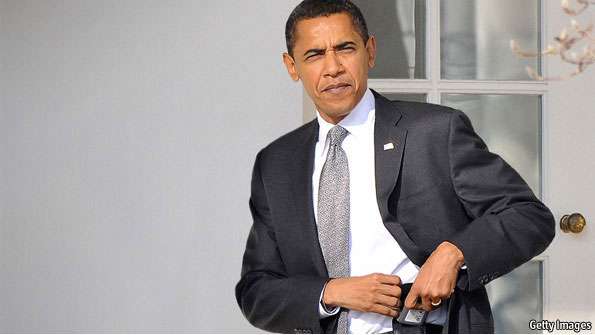 The Economist recently published an article about President Obama's rant against
digital devices in his speech to students at Hampton University on
May 9th. In this speech he said:
The Economist recently published an article about President Obama's rant against
digital devices in his speech to students at Hampton University on
May 9th. In this speech he said:
"With iPods and iPads and Xboxes and PlayStations—none of which I know how to work—information becomes a distraction, a diversion, a form of entertainment, rather than a tool of empowerment."
Hugo Chavez is now on twitter drawing thousands of people every day, turning a social network into a socialist network. Here we have President Obama, "surgically attached to his Blackberry" and getting very good mileage on Youtube, Facebook, Twitter during the campaign, warning against digital devices and new media. Funny world.
The article suggests that Obama is just shooting the messenger, that the warning probably has something to do with crazy theories about birth certificates of politicians in the blogsphere. Yet I will try to stay away from the muddy waters of politics.
However, I do agree with President Obama that devices have the potential of distraction, as well as the potential of "empowerment" and "emancipation", all depending on how you use it. Yes, if one doesn't know how to use it productively, or use it to hurt himself or herself, he or she is better off not using it. That being said, I also realize that the underlying assumption about this kind of claim is that some people can use technology well, and some cannot. That's not always correct. People can change. That's why there is a case for education. The ability to turn distraction into empowerment is not something that comes from nature. It is more from nurture. The ability to use technology for empowerment needs to be developed in the young. Educators can help students if they can teach them how to use technology responsibly and productively.
If one stops just at lamenting the good old days before a particular device, we are getting very close to a Socratic irony:
Socrates’s bugbear was the spread of the biggest-ever innovation in communications—writing. He feared that relying on written texts, rather than the oral tradition, would “create forgetfulness in the learners’ souls…they will trust to the external written characters and not remember of themselves.” Enos Hitchcock voiced a widespread concern about the latest publishing fad in 1790.
The article also lists Hillary Clinton's attack of video games for "stealing the innocence of our children" in 2005.
Which reminds me of a conversation I had with Dr. Alan Martin yesterday. He and I were looking for some useful videos about parenting styles on Youtube. We came upon one by Bill Cosby in which he warned about parents letting their kids use Gameboy or watch TV. "There is no job out there for playing games."
"There is," Dr. Martin laughed, "gaming design is one of our best known majors here."
0
推荐




 京公网安备 11010502034662号
京公网安备 11010502034662号 